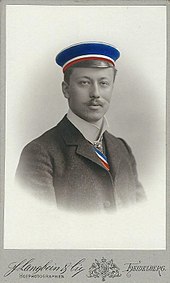Eugene Rümelin
Eugen Rümelin (born December 8, 1880 in Münster , † September 26, 1947 in Munich ) was a German diplomat during the Weimar Republic and National Socialism .
Life
Rümelin was a son of the future Lord Mayor of Stuttgart Emil von Rümelin and his wife Natalie, nee. Oesterlen. After attending grammar school in Heilbronn and Stuttgart, he studied law at the Ruprecht-Karls-Universität Heidelberg , where he was a member of the Corps Rhenania , as well as in Berlin and Tübingen. He completed his studies in 1904 with a doctorate to become Dr. iur. starting with a dissertation on the subject of "The constitutional concept of constitutional representation of the people and its applicability to the Alsace-Lorraine regional committee" with Professor Gerhard Anschütz .
In 1909 he entered the diplomatic service and after the end of his preparatory service in 1912 he was employed at the Consulate General in Constantinople , which was headed by Josef Mertens at that time . From 1914 to 1916 he took part in the First World War as captain of the reserve in the Württemberg field artillery regiment No. 29 , returned to the diplomatic service in 1916 and worked in the personnel department from 1916 to 1920.
After his promotion to the Real Legation Councilor , he finally became head of the Personnel and Salary Section in the Personnel and Administration Department of the Foreign Office in 1919 . In this function he played a major role in the reorganization of the Reich Foreign Ministry. In 1920 he was appointed head of the Germany department and then in 1922 head of subdivision IIIb ( Austrian successor states , Balkans ).
On March 10, 1923 he succeeded Mertens as envoy 1st class in Bulgaria . He held this office for 16 years until April 5, 1939. He also represented the incumbent ministers such as Gustav Stresemann in October 1927 that the German Reich was emerging from the troubled domestic political situation in the Balkans, such as in Regarding Macedonia should stay out. On June 1, 1934, he joined the NSDAP . In the Weimar Republic he was a member of the German People's Party .
In early 1940 he became head of the Foreign Trade Office in the Government of the General Government in Krakow . He worked there at his own request until he left in 1943.
In 1945 he settled in Vienna and died two years after the end of the Second World War . He found his final resting place in his parents' grave in the Prague cemetery in Stuttgart .
literature
- Maria Keipert (Red.): Biographical Handbook of the German Foreign Service 1871–1945. Published by the Foreign Office, Historical Service. Volume 3: Gerhard Keiper, Martin Kröger: L – R. Schöningh, Paderborn et al. 2008, ISBN 978-3-506-71842-6 .
- Berthold Kuhnert: Directory of the Heidelberg Rhenans living on November 1, 1937 . Unknown, p. 68
Web links
- Eugen Rümelin in the online version of the Reich Chancellery Edition Files. Weimar Republic
Individual evidence
- ↑ Stefan Troebst: The Macedonian Century. Oldenbourg, Munich 2007, ISBN 3-486-58050-7 , ISBN 978-3-486-58050-1 , p. 98 ( digitized version )
- ^ Gregor Thum: Dreamland East. German images of Eastern Europe in the 20th century. Vandenhoeck & Ruprecht, Göttingen 2006, ISBN 3-525-36295-1 , ISBN 978-3-525-36295-2 , p. 102 ( digitized version )
| personal data | |
|---|---|
| SURNAME | Rümelin, Eugene |
| BRIEF DESCRIPTION | German diplomat |
| DATE OF BIRTH | December 8, 1880 |
| PLACE OF BIRTH | Muenster |
| DATE OF DEATH | September 26, 1947 |
| Place of death | Munich |

